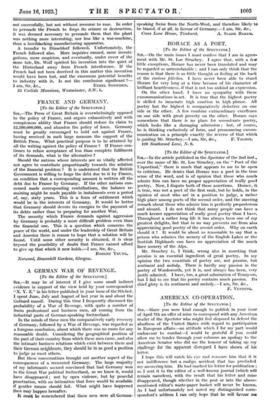THE RUHR AND TRADE DEVELOPMENT [To the Editor of the
SPECTATOR.] Sia,—We are told that the. French Government will not agree to any settlement of the Reparations question which does not include an abject surrender of German resistance to the French occupation of the Ruhr, and also acceptance of continued French occupation for an indefinite period.- British traders are realizing, as I realized during a recent visit to the occupation, the serious consequences of the French policy in the Ruhr ; see, for instance, Mr. Douglas Vickers's recent speech on the subject. But I should like to call attention to the effect which the occupation is having on German scientific development.
It was recently announced in the British Press that the Anglo-Scottish Finance Corporation had purchased the Munitions Ministry's explosive store and refining plant neat Chester. It is understood that this purchase has been made for the purpose of exploiting a new invention by Dr. Hermann Wolf, by which the yield of benzene and motor petrol from raw oils is doubled. Your readers may be interested to hear how this invention was saved from destruction during the recent riots in the Ruhr. So romantic has been the incident, and so elusive, that the inventor might well be called the Scientific Pimpernel.
From 1914 onwards Dr. Wolf had his apparatus installed, and was working towards its perfection, at Neuss, on the left bank of the Rhine. Owing to the exigencies of the War he was unable to obtain raw oil, so work was retarded until recently. Soon after this difficulty was overcome, however, a more formidable one sprang up in its place. The sudden appearance of the French troops on the hills outside the town necessitated its instant dismantling. This was carried out successfully, but not without recourse to ruse. In order to persuade the French to forgo its seizure or destruction, it was deemed necessary to persuade them that the plant was nothing more interesting, nor less like a war-machine, than a bootblacking manufacturing apparatus.
A transfer to Dusseldorf followed. Unfortunately, the French followed also. More inquiries ensued, more investi- gations, more suspicion, and eventually, under cover of the same tale, Dr. Wolf spirited his invention into the quiet of the Hinterland away from French interference. If the French had not been deceived in this matter this invention would have been lost, and the enormous potential benefits to industry with it. Is not the conclusion significant ?-







































 Previous page
Previous page